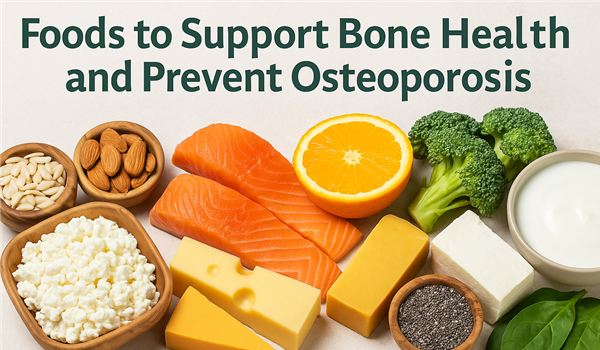Foods for bone health osteoporosis support

Patient Information Leaflet: Foods for Healthy Bones and Preventing Osteoporosis
Kensington Medical Centre – Belfast
⸻
Why Bone Health Matters
Your bones support your body and protect your organs. As you age, bones can become weaker — especially in women after menopause. Osteoporosis is a condition where bones become thin and fragile, increasing the risk of fractures.
Eating the right foods helps build and maintain strong bones at every age.
⸻
Key Nutrients for Bone Health
1. Calcium – Builds and maintains strong bones
2. Vitamin D – Helps your body absorb calcium
3. Protein – Supports bone structure and healing
4. Vitamin K and Magnesium – Support bone strength and repair
⸻
Best Food Sources for Strong Bones
Calcium-Rich Foods:
• Milk, yoghurt, cheese (choose low-fat options if needed)
• Fortified plant-based milks (e.g., almond, soy, oat milk)
• Leafy greens (e.g., kale, broccoli, bok choy)
• Canned fish with bones (e.g., salmon, sardines)
• Tofu (especially calcium-set types)
• Fortified cereals and bread
Vitamin D-Rich Foods:
• Oily fish (e.g., salmon, mackerel, sardines)
• Fortified foods (e.g., cereals, dairy, plant milks)
• Eggs (especially the yolk)
• Sunshine (your body makes vitamin D from sunlight – aim for short daily exposure in spring/summer)
Protein Sources:
• Meat, poultry, fish
• Eggs
• Dairy products
• Lentils, beans, chickpeas
• Nuts and seeds
Vitamin K and Magnesium Sources:
• Leafy green vegetables (spinach, kale)
• Avocados, bananas
• Wholegrains and nuts
• Pumpkin seeds, almonds
⸻
Helpful Tips for Bone Health
• Eat 3 servings of calcium-rich foods per day
• Take a 10 microgram vitamin D supplement daily during autumn and winter
• Stay active – weight-bearing exercises (like walking, dancing, or gardening) strengthen bones
• Don’t smoke, and keep alcohol within recommended limits
• Maintain a healthy body weight
⸻
Foods and Habits to Avoid
• Too much salt – can cause calcium loss
• Fizzy drinks – some contain phosphoric acid, which may affect bone health
• Very high caffeine – can reduce calcium absorption if taken in excess
• Crash diets or very low-calorie diets – may harm bone strength
⸻
When to See a Doctor
Speak to your GP if you:
• Have a family history of osteoporosis
• Have had broken bones from minor falls
• Are taking steroids or other medications that affect bone health
• Have been diagnosed with osteoporosis and want dietary advice
• Are postmenopausal or over 65 and haven’t had a bone health check
Your doctor may recommend a bone density scan or prescribe treatments to support bone health.
⸻
For more information, visit www.nhs.uk/conditions/osteoporosis
This leaflet is for general information only. Please speak to your healthcare provider for advice specific to you.
Medical Disclaimer
The dietary advice and information provided in this leaflet are for general guidance and educational purposes only. They are not intended to replace personalised advice, diagnosis, or treatment from a qualified healthcare professional.
If you have a medical condition, are taking medication, are pregnant or breastfeeding, or have specific dietary needs or food allergies, you should consult your GP, dietitian, or another healthcare provider before making significant changes to your diet.
Following general dietary recommendations without proper medical supervision may not be suitable for everyone and could result in unintended health effects. Always seek individualised medical advice for your personal health circumstances.
Page created: 01 June 2025